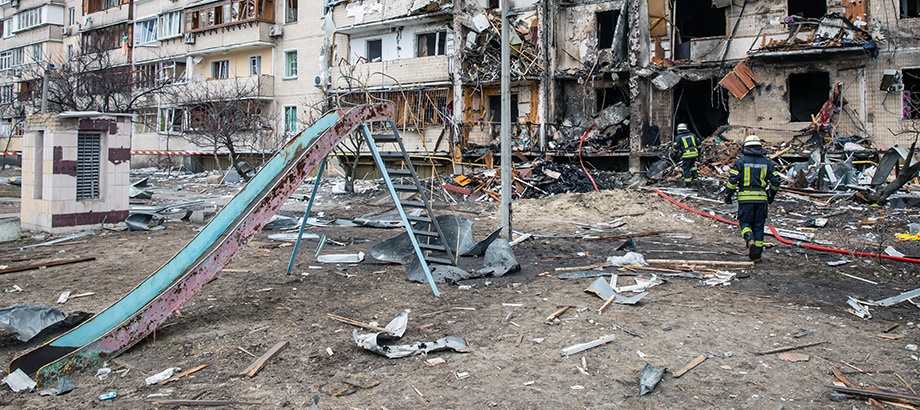Making Sense of Russia’s War Against Ukraine
Russia’s expanded war against Ukraine is still unfolding and has implications for us all. It surprised many – partly that it broke out at all, partly because of its extent and how it has developed. FOI’s researchers have now summarised some initial assessments of the war. This anthology is their contribution to start making sense of the war.

The anthology, Another Rude Awakening –, is a way of summarising the reactions and conclusions of some of FOI’s researchers about the latest invasion of Ukraine. It addresses the war in terms of security policy, military implications, new and old ways of warfare, activism and propaganda, as well as legal, civil defence and humanitarian aspects.
“Above all, it is an attempt to help readers understand what is happening. Since information – truth, propaganda and outright lies – is pouring in from all sides, this is a contribution to sorting it all out,” says Johan Norberg, Deputy Research Director, and author of one of the anthology’s chapters.
Many surprises
As the title suggests, the researchers were surprised in several respects.
“I myself, as a Russia analyst, thought for a long time that we wouldn’t see this invasion, that everything was an advanced hoax. I saw an invasion as military insanity, because Ukraine is so big. Another thing that surprised me is that it is so much like World War II, in everything from Russia’s rhetoric about the denazification of Ukraine to its massive use of artillery,” says Johan Norberg.
The war contradicts most assessments of a future war.
“Before the invasion of Ukraine, we talked a lot about postmodern warfare that could break a country through cyber and influence campaigns, perhaps together with a few precision strikes,” says Göran Bergström, Deputy Research Director and one of the editors.
The eventual invasion Göran Bergström envisioned was more like the annexation of Crimea.
“But Russia’s expanded aggression against Ukraine is a more traditional war over territory, resources and even population. One conclusion for potential future wars must therefore be that it doesn’t matter how postmodern we think we are if an adversary is fighting like they were in World War II,” he says.
Implications so far
The war is still unfolding and the pace of change this spring is tremendous. Security and defence policies are in flux — continuously shaped and reshaped.
“At FOI, we have been studying and following Russia for decades: from policy to projectile. This anthology is our way to take stock and summarise some observations so far. It is also our contribution to the larger security policy discussion with research colleagues, decision-makers and society at large”, concludes Johan Norberg.
The anthology includes 12 chapters with issues ranging from e.g. assessment of military capabilities and naval warfare, to propaganda and lessons on the protection of civilians.
Some highlights include:
Chapter 1: A War That Puts Theory and Ideals to the Test
A pervasive struggle is currently underway in Ukraine. It is not only military, but also about the ideas and structures that underpin a broader international order.
Chapter 2: Why We Got Russia Wrong
“War is a battle between wills. Ukraine’s spirited and capable defence thwarted Russian plans and exposed Russian weaknesses.”
Chapter 5: The use of drones in the Russo-Ukrainian war
“Drones are indispensable in modern warfare and currently are partly ahead of corresponding countermeasures.”
Chapter 6: The War at Sea: Naval and Maritime Operational and Strategic Aspects of Russia’s War against Ukraine.
“The war in the Black Sea has seen a mix of old and proven classical technologies with some new components; their combination has enabled tactical success . . . for Ukraine.”
Chapter 8: Propaganda in the Russian War against Ukraine – A Swedish Perspective
“One of the surprising aspects of the war has been the tendency of the Swedish debate to focus on, well…Sweden.”
Chapter 11: The need for a concept of protection of civilians in armed conflict
“Therefore, it is also pivotal for Sweden to develop a robust, relevant and resilient system for protection of civilians as part of its own preparedness.”
Read the Antologin Another Rude Awakening – Making Sense of Russia´s War Against Ukraine
